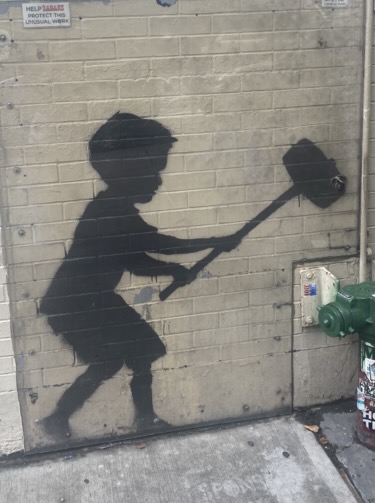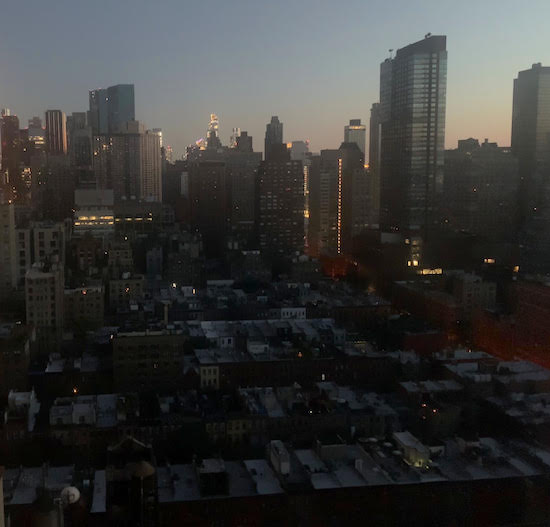
By Carol Tannenhauser
Monday, September 5, 2022
Afternoon showers, high 83 degrees.
Notices
Our calendar has lots of local events! Click on the link or the lady in the upper righthand corner.
Labor Day Thoughts
Maynard G. Krebs is a cultural icon. For those who haven’t had the pleasure, Maynard was the beatnik best friend of the title character on the sitcom called The Many Loves of Dobie Gillis, which ran from 1959 through 1963, but found a wider audience on cable TV later on. Played by the late, great Bob Denver before he left for Gilligan’s Island, Maynard’s claim to fame was his reaction to the word “work.”
“Work?!” he would yelp in response everytime it was mentioned, as if it were the most horrifying pursuit he could imagine.
Was Maynard prescient? Did he foresee the so-called “Great Resignation” of 2021, when 49.4 million American workers quit their jobs, according to the U.S. Bureau of Labor Statistics? Could he have imagined the trend that followed in the second half of 2022, an alternative to complete severance, known as “Quiet Quitting”?
“Quiet quitting is the trend of employees choosing to not go above and beyond in their jobs in ways that include refusing to answer emails during evenings or weekends, or skipping extra assignments that fall outside their core duties,” cnbc explained. It was popularized as many things seem to be today: on TikTok, as seen below.
@zaidleppelin On quiet quitting #workreform ♬ original sound – ruby
“Love and work…work and love, that’s all there is,” said Sigmund Freud, the 20th-century neurologist who founded psychoanalysis. In the 21st century, prompted mostly by the pandemic, Freud’s premise and the proportions allotted to life’s pursuits are being questioned — mostly by Millennials and Gen Zers, seeking a “better balance,” CNBC said, last month. Concurrently, “the rate of U.S. productivity is raising some concern.” Reuters reported. “Data on U.S. worker productivity posted its biggest ever annual drop in the second quarter [of 2022].”
Could Quiet Quitting lead to Frustrated Firing?
Not as likely in the current labor market. “Booming jobs creation has also meant fierce competition between employers for a limited labor supply,” The Washington Post wrote in September. “There continue to be roughly two open jobs for every job seeker, according to the July job openings report, and workers continued to quit their jobs at an elevated rate in July, in [the] phenomenon dubbed the ‘Great Resignation.'”
Anthony Klotz, a professor at Texas A&M University’s business school, coined the phrase “Great Resignation.” “I knew from talking to my students, workers, and business leaders that the pandemic had changed how many people felt about work,” he said, in a school publication.
“Workers saw that quitting their jobs gave them a chance to take control of their personal and professional lives….In broader terms, [the Great Resignation] describes how COVID-19 upended the centuries-old notion of what work is and how it should be done.”
Happy Labor Day!










This practice has a very long history, and a name: “Working to Rule.” “Quiet Quitting” is a term someone made up to make the workers sound lazy because they were ONLY doing their jobs and not something more. But “doing your job” isn’t “quitting,” quiet or otherwise. It’s doing your job.
We have this bizarre notion in America that companies should operate by the principle of absolute capitalism, in which they buy labor at its cheapest possible price, while workers are somehow morally obligated to operate by a principle of shared effort and sacrifice rather than demanding to be paid for all their labor. And that makes no sense.
If you went to Chipotle and paid for one burrito, you wouldn’t complain that you only got one burrito. You could buy more, but you didn’t. Similarly, people Working to Rule are simply saying “you paid me to do X. You could pay me to also do Y. I’d be willing to do Y… for pay. But if you’re only paying me for X, I’m no longer also doing Y.” That’s not quitting, that’s capitalism.
Isn’t part of the idea of “competition” that if you do better than the person in the next office you’ll get a higher raise and a faster promotion?
And who could blame a business owner for leaning in to that?
If we want to promote the idea that everyone should get ‘properly’ paid for the job they’re hired to do? Unionize.
That’s more the myth than the reality. There was a time where you could rise through the ranks. Theoretically start with a company at the bottom, say – in the Mail Room – and rise to one day become president by working harder than others. That’s no longer true. At least not in corporate American. People go to college and post-college to be able to walk into a position commensurate with their education. So they don’t really start at the bottom, they start in the “middle”. Then they may be able to rise by working un-Godly hours and ignoring their families, traveling often and sacrificing. But younger folks have been the beneficiaries of absent parents during their childhood. It wasn’t always a pleasant childhood. Sure they may have had money & prestige but they had absent parents. I believe they’d like to be present in their own lives and in the lives of any children.
I get it.
That’s cool if you never want to do anything new or better in your job. Being a typical drone isn’t fulfilling for most people even if they don’t realize it.
Right, the message for years was “do more than we pay you to do and we pinky promise you’ll advance and be more than a drone.” Didn’t work out that way for a lot of people. So instead you might as well get paid for your work.
I almost wrote that if you do more without added recognition and pay then go somewhere else, but I didn’t think it was necessary.
Right, just go across the street to the other place that pays the same and treats its people the exact same way. Why didn’t everyone think of that.
Meanwhile, the same people who are “quiet quitting” are also the ones expecting to stroll out of college and make 6 figures instantly – with a degree in fly fishing. For some reason, the idea of hard work doesn’t compute for these “quitters.” “Better balance”???? How about learning a skill on the job and being rewarded for it instead of staying in pajamas all day and mindlessly scrolling on tiktok…. these generations seem to want to have their cake and eat it too (don’t want to work but still get the compensation)
Most employers won’t teach skills on the job anymore. They expect young people to show up fully capable, having footed the bill to make themselves capable to do the employers’ work themselves. And then they wonder why young people don’t feel more loyalty to them!
Please keep in mind that 95% of the “great resignation” was people quitting one job to take another job.
Actually a lot of the great resignation was boomers entering retirement earlier than anticipated. Whether due to ageism in certain industries or completely voluntary. But it’s not because young people these days want to sit in their pyjamas.
Not to belabor the point, but 49.4 million quit jobs in 2021, but the labor force participation rate actually increased, by 0.7%, we added 6 million to payrolls, and the employment : population ratio went up by 2%.
Meaning that more people decided to seek work than retire, and the overwhelming majority of participants in “the great resignation” quit one job for another.
“…Maynard was the beatnick best friend …”
The word “beatnik” has no “c” in it. https://en.wikipedia.org/wiki/Beatnik ; https://www.merriam-webster.com/dictionary/beatnik .
Oops!
Like, thanks! fixed.
“Love and work, work and love, that is all there is”. Dr. Freud said this before the invention of radio, tv, movies, video, internet, air travel. Most of the people I know hate their jobs and work only to pay their bills. They are counting down to retirement.
A lot of them are divorced and have no desire to remarry. Generally speaking, they are doing just fine.
Pardon the typos😬
“Sex &Drugs &Rock & Roll” especially if …”all you ever do is business you don’t like…”
Ian Dury